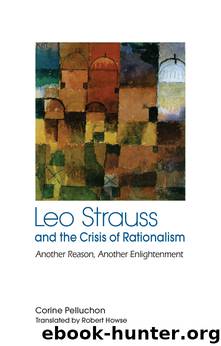Leo Strauss and the Crisis of Rationalism by Pelluchon Corine Howse Robert

Author:Pelluchon, Corine,Howse, Robert
Language: eng
Format: epub
Publisher: State University of New York Press
Published: 2014-01-02T16:00:00+00:00
Individualism, Liberalism, and Absolutism
The major contribution of Hobbes is the distinction between right and positive law and the theory of sovereignty, of which the foundation is not the good, but the natural rights of the individual. Hobbes asserts individualism in politics and provides the foundations of liberalism, of which one of the definitional traits is that the rights of man are more important than his duties. The law is determinative and binding, that is, obligatory, while right “consisteth in the liberty to do, or to forbeare.”29 The individual, prior to civil society, is the foundation of the state, the mission of which is to protect his life and secure his rights. By contrast, in classical political philosophy, duty has primacy, because man is unable to pursue the perfection of his nature except through civil society, which preexists him. Friendship as the basis for social relations between beings who share common ideas is replaced by a sense of solitude. Man leaves his solitude by necessity. The Moderns, from Hobbes to Rousseau and Kant, believe that individuals need one another in order to live, but social life is no longer a pleasure in and of itself. It is considered as alienating, and one prefers solitary dreaming (Rousseau) or approaches it with a fundamental ambivalence (Kant).30
The conception of man that underpins the political thought of Hobbes corresponds to the radical affirmation of subjectivity. Human nature, far from being an abstract ideal, is the reality of every individual (every man). Right is the power belonging to each individual taken in his particularity. Natural right, unconditional and secularized, is not a juridical category but a “necessity of nature.” It is a drive to self-preservation characteristic of the mechanism of the living human being that, because of the complexities of the human machine, cannot but unleash a war of all against all. In and of itself, natural right is alien to all rule. But the contradictions and misery that ensue will make necessary the transformation of right: “Reason suggesteth convenient Articles of Peace, upon which men may be drawn to agreement. These Articles are … are called the Lawes of Nature.”31
Hobbes asserts the natural (ontological) priority of right to positive law and political priority of positive law to right. The natural (ontological) priority of right to positive law, and defining the individual in terms of his liberty and not in terms of submission to an order that transcends him, are the foundations of modern thought. We will rediscover in Rousseau this definition of the nature or essence of man in terms of liberty, as well as the idea that the political community is an absolute sovereign, founded and deduced from the state of nature, which is capable of other interpretations but is linked to the idea of contract. Hobbes establishes a new philosophy of right that responds to this new definition of man as autonomous individual. There is a political agenda implied by this definition of right that is rooted in individual will. Conceptualized as a
Download
This site does not store any files on its server. We only index and link to content provided by other sites. Please contact the content providers to delete copyright contents if any and email us, we'll remove relevant links or contents immediately.
The remains of the day by Kazuo Ishiguro(8977)
Tools of Titans by Timothy Ferriss(8369)
Giovanni's Room by James Baldwin(7330)
The Black Swan by Nassim Nicholas Taleb(7109)
Inner Engineering: A Yogi's Guide to Joy by Sadhguru(6785)
The Way of Zen by Alan W. Watts(6601)
Asking the Right Questions: A Guide to Critical Thinking by M. Neil Browne & Stuart M. Keeley(5760)
The Power of Now: A Guide to Spiritual Enlightenment by Eckhart Tolle(5758)
The Six Wives Of Henry VIII (WOMEN IN HISTORY) by Fraser Antonia(5501)
Astrophysics for People in a Hurry by Neil DeGrasse Tyson(5182)
Housekeeping by Marilynne Robinson(4436)
12 Rules for Life by Jordan B. Peterson(4299)
Double Down (Diary of a Wimpy Kid Book 11) by Jeff Kinney(4261)
Ikigai by Héctor García & Francesc Miralles(4247)
The Ethical Slut by Janet W. Hardy(4242)
Skin in the Game by Nassim Nicholas Taleb(4239)
The Art of Happiness by The Dalai Lama(4125)
Skin in the Game: Hidden Asymmetries in Daily Life by Nassim Nicholas Taleb(3992)
Walking by Henry David Thoreau(3953)
